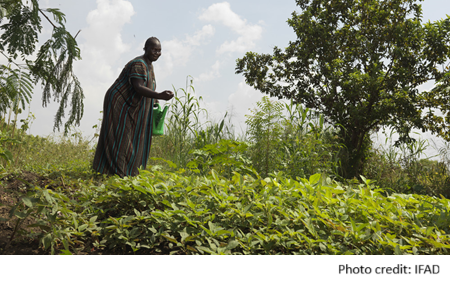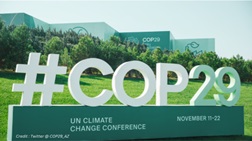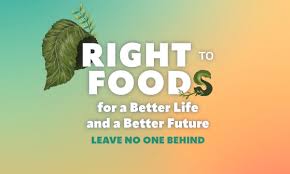The federal government announced on Friday that it is joining COVAX - the COVID Vaccine Global Access Facility. COVAX is a collaborative global effort established to deliver fair, equitable and timely access to vaccines to all participating countries. Canada has committed $220 million to COVAX for procurement of vaccines for Canadians and an additional $220 million to COVAX AMC to make possible equitable distribution of vaccines to middle- and lower-income countries that cannot fully afford to pay for COVID-19 vaccines themselves.
As stated in the announcement, "...We cannot beat this virus in Canada unless we end it everywhere."
Click here for the full news release.
“… This is an opportunity for us to reset the world we are living in, and not just return to normal.” -- Nobel laureate, Malala Yousafzai
Five million Canadian children returned to school this month, adapting to new norms in the classroom and virtual learning. While we try to figure out what the new normal is, there are millions of other children around the world, especially adolescent girls, who may never return to school due to extreme poverty, early child marriage, violence, and other forms of exploitation. The COVID-19 pandemic has had a devastating impact on the world’s education systems, threatening a loss of learning that may affect an entire generation of students.
In this opinion article from The Guardian, Malala Yousafzai describes the impact of school closures on the most disadvantaged children, especially girls, and outlines what is needed to ensure that girls’ education is not ignored, urging a commitment to transformative change in education, not simply a return to normal.
To read more, click here.
The Canadian Council for International Cooperation (CCIC) is calling on Canada to step up investment to ensure an effective global COVID-19 response.
“The pandemic has exacerbated pre-existing gaps in access to resources, health, and food and has disproportionately impacted already marginalized groups. These disparities are only becoming more lethal as the world waits to act. It is estimated that COVID-19 will push 71 million people into extreme poverty and 265 million into acute food insecurity and result in 117 million missed child vaccinations and 31 million additional cases of gender-based violence. The world must act now to protect the lives of the most vulnerable and ensure no one is left behind.”
Continue reading the full article here.
“As the world faces unsustainable levels of inequality, we need education – the great equalizer – more than ever. We must take bold steps now, to create inclusive, resilient, quality education systems fit for the future.” -- UN Secretary General António Guterres
We are at a defining moment for the world’s children and young people. The COVID-19 pandemic has created the most severe disruption in the world’s education systems in history and is threatening a loss of learning that may stretch beyond one generation of students. In response, the United Nations has published a Policy Brief on actions needed during COVID-19 and beyond, and is launching a new campaign with education partners, “Save our Future”.
Click here for UN Secretary General António Guterres’ statement outlining the UN's four key recommendations for action.
You can access the full text of the Policy Brief, "Education during COVID-19 and beyond", by clicking here.
Graça Machel, Dr. Ngozi Okonjo-Iweala, Dr. Vera Songwe, and Maria Ramos have written an open letter outlining the multiple impacts the COVID-19 pandemic is having on African women. They call for bold action in response, with women and women's leadership placed at the centre of recovery efforts.
"COVID-19 presents us with unprecedented opportunities for the regeneration of the African socio-economic landscape and the movement towards a just, equitable and sustainably prosperous continent. Let us dare not squander this opportunity for a rebirth."
You can read the full letter by clicking here.
Save the Date: September 25th, 2020 Fridays For Future has begun planning for the next Global Day of Climate Action scheduled for Friday September 25. GRANs are encouraged to join millions of others around the world in solidarity, to demonstrate a strong voice expressing our concern about the climate crisis and the future of the planet that we are leaving to our grandchildren and future generations. There are solutions. The time to act is now. Click here for more information. Specifc details will follow closer to the date.
The Global Partnership for Education’s (GPE’s) latest annual report is showing that great strides are being made to bring quality education to the world’s most marginalized children. Although many challenges remain, especially for girls, and the pace must pick up, progress is being made in such areas as gender parity, gender responsive education, primary school completion rates and more robust domestic financing in partner countries. Click here to read more about GPE’s accomplishments where you can also download the report to learn more.
The GPE is in the process of developing its new strategic plan for the years 2021-2025. Much work still needs to be done and progress will need to accelerate to achieve Sustainable Development Goal Four (SDG4) by 2030.

http://grandmothersadvocacy.org
grandmothersadvocacy@gmail.com
“My message to girls around the world facing education challenges would be this: “You are worth it. I know it is hard and there are a lot of challenges you are facing. But your hopes and dreams are worth fighting for. You have so much to offer the world. You and your voice and your experience matter. The world needs you to keep studying, to keep dreaming, to keep pushing for what you want to see in the world.” -- Karina Gould, Minister of International Development
Canada recently committed $5.5 million to Education Cannot Wait (ECW) to support their response to the COVID-19 pandemic in meeting the educational needs of children and youth caught in emergencies.
In ECW's informative interview with Karina Gould, we hear from Canada’s Minister of International Development who is a strong advocate for girls’ education. Click here to read the full interview and get to know more about Karina Gould and why she believes that education is fundamental to achieving gender equality.
June 20th marks World Refugee Day. For millions of women and girls among the world’s ever-growing refugee population, education remains an aspiration, not a reality. In Africa, COVID-19 is, in fact, amplifying the struggle that children are already facing to reach a quality education. Malala Fund research is showing that, globally, up to 10 million secondary school aged girls may never return to the classroom due to harmful gender norms, early child marriage, child labour and strains on household and government spending.
Click here to read more about the UNHCR’s (UN Refugee Agency) commitment to making education for refugee girls a priority.
In this 25-minute podcast, Africa’s and Ireland’s first female heads of state, Ellen Johnson Sirleaf and Mary Robinson, discuss a wide range of topics, from feminist leadership to the COVID-19 response, and progress on the UN Sustainable Development Goals and development in Africa.
Click here to listen.
Pages



